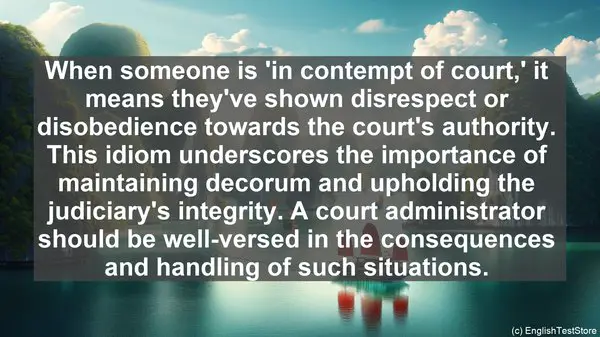Introduction: The Power of Idioms in Language
Welcome to today’s lesson. Language is a powerful tool, and one aspect that adds richness and depth to it is idioms. Idioms are expressions that go beyond their literal meanings, often carrying cultural or contextual significance. In the legal field, where precision and nuance are crucial, idioms play a fascinating role. Today, we’ll explore the top 10 idioms that can greatly benefit a court administrator.
1. ‘The Ball is in Your Court’
This idiom means that it’s someone’s turn to take action or make a decision. In a courtroom scenario, it can indicate that the responsibility lies with a particular party or judge to move the proceedings forward. Understanding this idiom helps a court administrator gauge the dynamics of a case and anticipate the next steps.

2. ‘To Throw the Book at Someone’
When someone is ‘throwing the book’ at another person, it means they’re imposing the maximum possible punishment or penalty. This idiom highlights the severity of the consequences. For a court administrator, being aware of this idiom’s implications can provide insights into the potential outcomes of a case and the gravity of the charges.

3. ‘To Have a Day in Court’
This idiom refers to the opportunity for someone to present their case or argument in court. It emphasizes the importance of due process and fairness. For a court administrator, understanding this idiom is crucial in ensuring that all parties involved receive their rightful chance to be heard.
4. ‘To Settle Out of Court’
When a legal dispute is ‘settled out of court,’ it means the involved parties have reached an agreement or resolution without the need for a trial. This idiom highlights the potential benefits of negotiation and compromise. A court administrator should be familiar with this idiom to navigate the various paths a case can take.
5. ‘To Plead the Fifth’
In the United States, the Fifth Amendment grants individuals the right to remain silent to avoid self-incrimination. When someone ‘pleads the fifth,’ they’re invoking this right. This idiom is particularly significant in criminal cases. A court administrator should be well-versed in this idiom’s implications to ensure the protection of individuals’ rights.
6. ‘To Go to the Mat’
This idiom, originating from wrestling, means to fully commit to a fight or dispute. In a legal context, it can indicate a party’s determination to pursue a case relentlessly. Understanding this idiom helps a court administrator gauge the intensity and potential duration of a legal battle.
7. ‘To Be in Contempt of Court’
When someone is ‘in contempt of court,’ it means they’ve shown disrespect or disobedience towards the court’s authority. This idiom underscores the importance of maintaining decorum and upholding the judiciary’s integrity. A court administrator should be well-versed in the consequences and handling of such situations.
8. ‘To Open a Can of Worms’
This idiom refers to a situation or action that, once initiated, leads to a cascade of problems or complications. In a legal setting, it can indicate the potential ramifications of a particular decision or course of action. Being aware of this idiom helps a court administrator anticipate the wider implications of their choices.
9. ‘To Have a Squeaky-Clean Record’
When someone has a ‘squeaky-clean record,’ it means their past is devoid of any legal or ethical blemishes. This idiom is often used to emphasize a person’s credibility or trustworthiness. For a court administrator, understanding this idiom can be relevant when evaluating the background or reputation of individuals involved in a case.
10. ‘To Be Guilty as Charged’
This idiom means that someone is indeed guilty of the alleged offense. It’s a straightforward expression that underscores a person’s culpability. A court administrator should be familiar with this idiom’s implications, especially when it comes to the determination of guilt or innocence.
Conclusion: The Language of the Courtroom
Language, in all its forms, is an integral part of the legal world. Idioms, with their nuanced meanings and cultural references, add an extra layer of depth to legal discourse. For a court administrator, being well-versed in idiomatic expressions can enhance their understanding of cases, interactions, and the overall dynamics of the courtroom. So, dive into the world of idioms, and you’ll uncover a treasure trove of linguistic insights. Thank you for watching, and see you in the next lesson!
